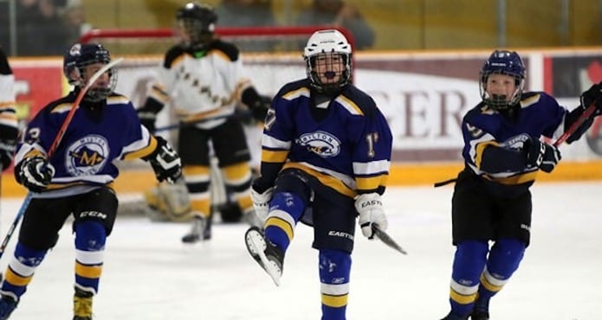Is there anything more important than teamwork and encouraging your teammates when playing a team sport? Most of the time, hockey requires your entire team working as a cohesive unit in order to find success. You can have great players on your team, but two-thirds of the game those players are not even on the ice. In order for your team to succeed, everyone needs to be on the same page and working towards the same goals. That is why there always needs to be positive vibes on the bench and in the dressing room, so that no teammates feel discouraged or excluded from the team. Let’s take a look at some reasons why we always need to encourage our teammates!
It’s just a game!
Perhaps the most overlooked part of hockey is that at the end of the day, it is truly just a game. Our teammates are our friends and family, and we should always want them to succeed on and off the ice. Encouraging them after they make a giveaway or let in a goal, is an excellent way of helping them with their confidence and avoiding potential mistakes or uncertainty in the future. Hockey is such a mental sport and a tap on the back or a kind, encouraging word will go a long way in not only helping your teammates, but also building your own leadership skills in life. Besides, if you ever get to sit on an NHL bench, there is rarely a word of negativity directed at their own teammates during the game. The true leaders on the team always bring positivity and encouragement to their teammates whenever it is needed.
It all starts with the parents
As with so many other things in a young hockey player’s life, positive reinforcement and support from parents can be instrumental in how the player interacts with their teammates. Hockey parents, see point one, it’s just a game. But how we react and speak to our children about what happens on the ice has a trickle down effect to how they behave on the ice. Encouraging your children after an off game or a loss can help build their confidence for the next game, and ward off any resentment or negative feelings they may begin to develop towards playing. After all, the only thing we should be concerned about is if our children are having fun out there! If they’re not, chances are we need to take a moment to think about how much pressure we are putting on them before, during, and after the game.
Negativity Breeds Negativity
Is there ever a good reason for throwing blame or pointing fingers at your teammates? If you know of one, we’d love to know it. The saying is negativity breeds negativity, meaning that all it takes is for one negative thing to be said before the entire team is feeling bad about themselves. If you are angry, take a deep breath. If you are frustrated, the odds are that your teammates are as well. The last thing they need is to be criticized or discouraged as the entire team’s confidence teeters on the edge. You will be surprised at how a little encouragement can quickly change the mood of the bench as players are no longer dwelling on things that already happened and can focus on how to improve on situations in the future.
Don’t blame the goalie!
I remember this well from playing youth hockey! So often hockey goaltenders shoulder the blame of a loss after letting in a bad goal, or sometimes, just for letting in more goals than the other goaltender. It is a position that is easy to pin losses on, like a pitcher in baseball, or a quarterback in football, the goaltender in hockey is the last line of defense and is often directly responsible for a team’s success. But just as no one player can be responsible for a team’s win, no one player (or goalie) should be responsible for a team’s loss. The team wins and loses as a team, no ifs, and, or buts about it. If a goalie lets in a weak goal, encourage them for the next time or remind them of how many shots they have saved to give the team a chance to win. No player on the team should be blamed for a team’s defeat, but especially a player who plays a position that 95% of hockey players would never even consider playing.
The Golden Rule
It all comes back to the golden rule, in hockey, in sports, and in life. Do unto others as you would have them do to you. There are countless iterations of this but ultimately, they all say the same thing: put yourself in someone else’s shoes before treating them a certain way. Would you want to be criticized or blamed for a mistake that happened on the ice? My guess is you wouldn’t. Before you let your temper or frustration get the better of what you have to say to your teammates, just take a second and think about how they are feeling. It’s almost like kicking your friend when they are already down. The NHL has had so many great players that we all look up to, not just for their talent, but for their leadership on and off the ice. Do you think Steve Yzerman or Joe Sakic or Sidney Crosby ever cursed out their teammates or blamed them for a mistake they made? Absolutely not. Part of being a great player is also being a great leader for your teammates, and it is often why they become Captains of their team. Sure, scoring goals is impressive and important, but lifting your teammates up and helping them to succeed is something your whole team benefits from.






